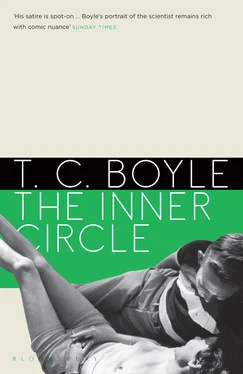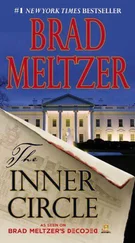“I’d like to be part of it, I would,” Rutledge went on, as if I’d been contradicting him. “And I love this town, did I mention that? Seems like a terrific place to raise kids.”
I had nothing to say to this, but he was just talking to hear himself in any case. There was a proposition on the table — should he or shouldn’t he? — and he was trying very hard to convince himself that he should. “By the way,” he said, just as we were coming up on the campus, “do you and Iris have any kids?”
“No,” I said, “but we’d like to. We’re, well, we’re trying, that is.”
He gave me a grin. “Trying, huh?”
“Yeah,” I said, and I grinned back.
“When you come down to it”—two fingers went to his mustache—“it’s all just another facet of the research, isn’t it?”
Prok spent most of the day cloistered with him, then we had dinner at a restaurant — just the four of us, spouses not invited — and Prok must have peppered Rutledge with a thousand questions, and this after both he and his wife had given up their histories. There was drinking, though Prok abstained, and Rutledge, either out of temperance or calculation — he knew he was still on trial here — stopped after two highballs and tucked into his dinner with real appetite, Prok’s third degree notwithstanding. I had enough to drink so that I could feel myself drifting out of my body for whole seconds at a time, but nothing excessive, nothing that would draw attention to myself, and Corcoran, who could hold his liquor as well as anyone I’d ever met, imbibed pretty steadily throughout the meal, almost as if he were conditioning himself for some test of endurance. Which, as it turned out, he was.
No one had clued me in, but I could guess from Prok’s expression that there was to be some further test or demonstration yet to come, and when Corcoran excused himself before dessert with a wink for the company and the promise that he’d see us in just a bit, my suspicions were confirmed. “Well,” Prok said, as we spooned up ice cream and sponge cake and the waitress lurked in the background, “it’s been quite an evening. Quite a day, in fact, and I hope you’ve enjoyed it, Oscar”—and here he used Rutledge’s given name for the first time, a clue that something was afoot, because he made a point of addressing his team by surname only—“as much as I have. And, I’m sure, Milk has. Haven’t you, Milk?”
I answered in the affirmative, as did Rutledge. “It’s been grand,” he said, “and I have to say I’m impressed, Dr. Kinsey, with everything you’ve showed me here—”
Prok had set down his spoon and was staring across the table at Rutledge over the bridge of his intertwined fingers. His face showed nothing — Prok the impassive, Prok the interviewer, the open and accessible and nonjudgmental — but his eyes flashed with excitement. “Call me Prok,” he said.
Rutledge ducked his head, put a hand to the back of his neck and came up smiling. “Yes, sure,” he said. “It’ll be a pleasure. Prok.”
“Good, good, good,” Prok murmured, and he called for the check then and spent the next several minutes looking it over and carefully counting out the exact change plus a three-percent tip, while Rutledge and I exchanged small talk in a collegial way. “All right,” Prok said finally, pushing the neat pile of bills and coins away from him, “and now let’s just retire to my place for some more talk and some good strong coffee, if you think you can stand it at this hour”—he paused, grinning now—“because I’ve got something arranged for your benefit, Rutledge, and yours too, Milk, a demonstration, actually, that should prove more than interesting. Shall we?”
When we turned in at the familiar winding path to Prok’s house, there were two figures waiting for us on the porch, their silhouettes visible against the glow from within. One of them was Corcoran, quickly withdrawing a cigarette from his mouth and grinding it under his heel; the other was a young woman I’d never seen before. Introductions were made on the porch—“This is Betty, Prok, the girl I was telling you about? Betty, Dr. Kinsey. John Milk. Oscar Rutledge”—and then we were in the vestibule, Prok singing out “Mac, we’re here!”
I barely had time to steal a glance at the young woman — she was a tall brunette with girlish features, high cheekbones and dark darting eyes that all but vanished when she smiled, and she was smiling now, nervously, her teeth sharp-edged and vaguely predatory — before Mac was on us. Mac must have been waiting just behind the kitchen door, because there she was, in a plain shift, barefooted, with a tray of coffee accessories and a plate of oatmeal cookies she’d baked fresh for the occasion. She wasn’t wearing any lipstick or makeup and though she’d brushed her hair the curl didn’t seem to want to hold. She looked tired. Looked old. “But come in, come in,” she urged, ushering us into the living room even as Prok excused himself and disappeared through the door to the kitchen. I wondered about that for a moment — he seemed preternaturally excited, like a boy on the eve of his birthday, and what was he up to? — until he came hustling back into the room a moment later with the coffeepot and his tray of liqueurs.
We took seats around the coffee table and chatted about this and that while Mac poured coffee and Prok offered the liqueurs to each of us in turn. Aside from the hesitant murmurs of our conversation— Care for cream? Yes, thank you —it was very still. Moths threw themselves at the screens in soft, arthropodal explosions. From the yard, there was the sound of crickets, dense and sustaining. The girl, I noticed, selected one of the least palatable of the liqueurs and downed it in a single gulp as if she were standing at the rail in some back-alley bar, and Prok immediately poured her another. She was wearing a thin silver chain at her throat, and when she threw her head back to drain the second glass, I saw a flash of silver and the miniature cross with its miniature Jesus riding up her breastbone.
Prok took a seat in the armchair beside the girl, his elegant, tapered fingers gripping and releasing the bright black loops of the bentwood as he eased himself down. “Splendid,” he said. “Isn’t this splendid?” But he was too excited to sit back and relax, and he leaned forward almost immediately, hands splayed across his knees. “Betty,” he said, dropping one shoulder and leaning in confidentially, “I can’t begin to tell you how pleased we are — pleased and honored — that you’ve agreed to this.”
The girl looked to Corcoran as if she were lost, then bowed her head and offered a demurrer, sotto voce. “It’s nothing, really.”
“But you are discreet — at least that’s what Corcoran told me. You are, aren’t you?”
She began to say yes in a voice that got lost in her throat, and then she repeated herself, in a firmer tone. “Yes,” she said. “I’m discreet.”
“We can rely on you, can’t we?” Prok was giving her his sternest look. “What happens here in this house is strictly between those of us present, is that understood? And that no gossip, no mention of your assistance here with the research tonight is ever, ever, I repeat, to go any further than these rooms?”
“She’s all right, Prok,” Corcoran put in.
Rutledge, all but forgotten — wasn’t he the main attraction here? — sat over his urine-colored liqueur and tried for an anything-goes sort of smile that withered on his lips. He was nervous suddenly. And, frankly, so was I.
“But I want to hear it from Betty’s lips. Betty?”
“I understand,” she said, and her eyes dodged away from Prok’s to fix on Corcoran. “But are we going to sit here and gab all night? Because if we are—” She got to her feet then, a tall girl, anything but frail, the lineaments of her figure discernible in a sudden sweep and release of movement beneath her clothes. She never finished the thought, or threat or whatever it was, but just stood there glaring at us now, as if she’d thrown down a challenge we were loath to accept.
Читать дальше












